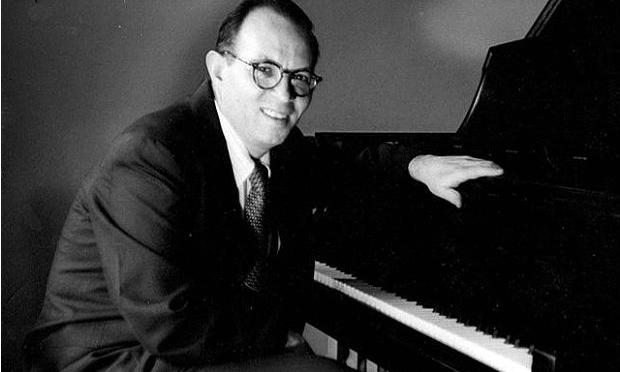STAY WITH ME - Jerome Moross (1913-1983)
"Stay with Me" has been in the news lately. No, I don't mean the song by Sam Smith that inadvertently rips off Tom Petty's "Won't Back Down," but the song of the same title that Bob Dylan sings on his new album, "Shadows in the Night." This "Stay with Me" was also released as a single and Dylan closed many of his concerts last year with it.
When the most important songwriter of the last fifty years puts out an album of standards, the songs he selects receive a rarified stamp of approval. While some of the tracks on "Shadows" are quite well known (Irving Berlin's "What'll I Do" and Rodgers and Hammerstein's "Some Enchanted Evening"), others are underappreciated gems.
"Stay with Me" falls into the latter category. A spiritual song that's less about religion and more about human hope and fear, it brings to mind "You'll Never Walk Alone" and "Lucky Old Sun," standards which Johnny Cash sang on his American Recording series.
Like Cash's covers, Dylan's version of "Stay with Me" is stripped down to an elegant arrangement, sans any orchestration, and makes evocative use of the miles on the singer's voice. Seldom has Dylan sounded so appealingly vulnerable.
So where did this song come from? Like all the other songs on "Shadows in the Night," it was sung by Frank Sinatra. In June, 1965, a month before Dylan's "Like a Rolling Stone" turned pop music on its ear, Sinatra released an album that included "Stay with Me," which he had recorded as the theme song for "The Cardinal" in 1963.
"The Cardinal," directed by Otto Preminger, was awarded the Golden Globe for Best Picture. It tells the story of an American priest who overcomes various crises as he rises in the Church hierarchy.
The film features an outstanding score by Jerome Moss, who also composed the music for the theme song; the song's lyrics were written by Carolyn Leigh ("Witchcraft," "The Best is Yet to Come").
The film features an outstanding score by Jerome Moss, who also composed the music for the theme song; the song's lyrics were written by Carolyn Leigh ("Witchcraft," "The Best is Yet to Come").
Moross, an accomplished composer, is best known for his scores for "The Big Country" and "Wagon Train," but he was also an innovator who wrote for Broadway and classical ensembles.
Moross's daughter, Susanna Moross Tarjan, put together a fantastic site for her father's centennial. She took the time to answer my questions about "Stay with Me" and I'm happy to share her thoughts with you.
1 - What did your father think of rock singers/songwriters like Bob Dylan?
Susanna Moross Tarjan: I have no idea what my father thought about Bob Dylan, or even if he did. Remember, he died in 1983 and had been quite sick for some time. I'm not sure how aware he was of all that. However, he did not like "Rock and Roll." He also didn't like Moog synthesizers, which were popular at that time. I think he'd be amazed at what synthesizers sound like today, and MP3. He didn't even know about CDs, which changed everything for me as far as getting his music "out there."
2 - What do you think of Dylan's version of "Stay with Me"?
SMT: I find Dylan's version of "Stay With Me" very moving. The song clearly arouses some spiritual feelings in him which he conveys. I think it has a different quality than any other song on the album.
3 - As far as I can tell, "Stay with Me" is the only song your father wrote with Songwriting Hall of Fame lyricist Carolyn Leigh. What do you know about that collaboration?
SMT: I don't know how that came about. I would guess that it came via the film company. The recording came about because Frank Sinatra was a friend of hers and she asked him to do it as a favor to her. I'm so glad he did. It's such a beautiful recording. For people who haven't heard it, it's on YouTube.
4 - "The Cardinal" was unusual in that your father, who composed the score for the film in addition to co-writing the theme song, went on location with the production from start to finish. Was "Stay With Me" part of that journey?
SMT: "Stay With Me" came after the film and score were done. It was unusual for the composer to go along with the production company. My father acted as the traveling music department. But he loved it. He had a lot of interesting experiences, including trying to find "Horst-Wessel" songs in Vienna that he needed for a Nazi marching scene. Of course no one had ever heard of them but finally his driver helped him. He and my mother had a great expenses paid trip to Europe and she had never been before. This was long before the days of deregulation and cheap fares.
5 - Did your father ever play "Stay with Me," or sing it at home, or talk about it in his later years, or was it simply one of many things he composed before moving on to other projects?
(see answer to #6)
6 - What did your father think of Frank Sinatra's original version of "Stay with Me"?
SMT: I wasn't living at home then so I don't know how often he played it. He certainly liked the song and I know he loved Frank Sinatra's version. However, like with other works, he moved on to other projects.
 |
| Susanna and Jerome Moss @ 1944 |
7 - Your father wrote ballets, a symphony, film scores, Broadway musicals and more. Much of his work is longer form and instrumental. Is there anything in "Stay with Me" that you feel is reflective of his work as a whole or is it atypical?
SMT: "Stay With Me" is reflective of his work in that it is a beautiful melody. He never gave up writing tonal music even though it wasn't in fashion during his prime years. He believed there was always another tune to be written.


No comments:
Post a Comment